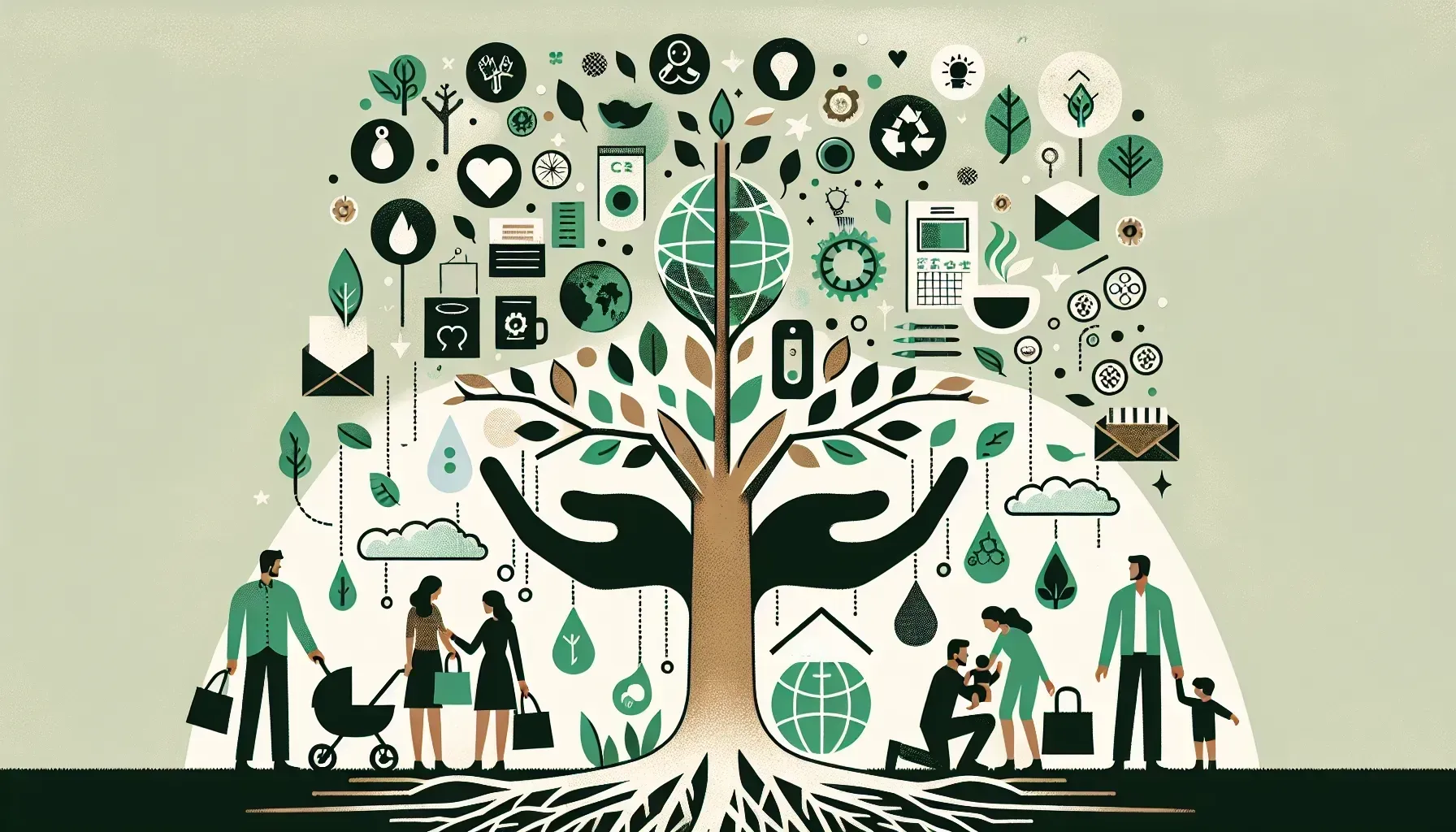Green Generations: Tracing the Growth of Eco-Conscious Parenting

Understanding Eco-Conscious Parenting: A Modern Shift
In recent years, there has been a notable shift towards eco-conscious parenting, emphasizing sustainability, environmental stewardship, and conscious consumer choices in family life. This movement, rooted in a rich history of environmental activism, has gradually evolved into a mainstream approach to modern parenting. As more families embrace the ethos of green living, they are presented with both opportunities and challenges in cultivating a generation that values and prioritizes the well-being of the planet. Let's delve into the origins, development, and practical aspects of eco-conscious parenting, offering actionable insights for families seeking to foster environmentally aware and responsible values within their households.
The foundation of eco-conscious parenting can be traced back to the environmental activism of the 1960s and 1970s. During this era, pioneering advocates raised awareness about pollution, resource depletion, and the overarching impact of human activities on the natural world. It was within this context that the concept of integrating environmental consciousness into family life took root. Visionaries within these movements emphasized the interconnectedness of all living beings and the responsibility incumbent upon parents to instill an unwavering respect for nature within their children.
Roots in Activism: The Early Movements and Family Life
Over time, the principles of eco-conscious parenting transitioned from niche ideologies to integral components of mainstream parenting practices. This evolution was facilitated by the growing understanding of environmental issues, coupled with advancements in sustainable technology and an expanding market for eco-friendly products. As concerns about climate change and ecological sustainability gained prominence, parents increasingly sought ways to align their family lifestyles with principles of environmental responsibility.
Mainstreaming Green Living: Eco-Conscious Parenting Today
One fundamental aspect of eco-conscious parenting lies in adopting sustainable practices across various dimensions of family life. This encompasses choices related to child-rearing products, such as environmentally friendly diapers and baby care items, as well as eco-sensitive dietary preferences that prioritize organic, locally sourced, and low-impact foods. Moreover, consciously selecting energy-efficient home appliances and reducing household waste through recycling and upcycling further contribute to fostering a holistic eco-aware environment for children.
From Diapers to Diet: Sustainable Choices for Families
Integrating eco-friendly practices into daily routines can yield profound impacts on a family's environmental footprint. Simple yet impactful actions like minimizing single-use plastics, conserving water and energy, and embracing minimalist living can empower parents to set inspiring examples for their children while significantly reducing their household's ecological impact. Furthermore, prioritizing the purchase of durable and ethically produced goods serves as a testament to conscious consumerism that resonates with the principles of eco-conscious parenting.
Collaborating with educational institutions committed to environmental education empowers parents to reinforce eco-conscious values beyond the confines of their homes. Schools and programs that integrate comprehensive environmental education curricula play an instrumental role in nurturing ecological literacy among children. By actively engaging with such educational endeavors, parents provide opportunities for their children to develop a deep understanding of ecological systems and foster an enduring appreciation for nature.
Sustainability Starts at Home: Daily Eco-Friendly Practices
Harnessing the power of technology, families can leverage carbon footprint calculators and eco-conscious lifestyle apps to make informed decisions affecting their ecological impact. These digital tools enable parents to track their environmental footprint across various aspects of daily life, empowering them to identify areas for improvement and implement meaningful changes. By utilizing these resources, families can streamline their transition towards more sustainable consumption patterns while fostering an ongoing dialogue about eco-conscious decision-making.
Educational Endeavors: Supporting Environmental Stewardship
At the heart of eco-conscious parenting lies a commitment to nurturing a profound connection between children and the natural world. Through outdoor activities, nature exploration expeditions, and active participation in conservation initiatives, parents can imbue in their children an innate love for nature while fostering a sense of responsibility towards preserving the planet's fragile ecosystems. By nurturing this bond from early childhood through adolescence, parents play pivotal roles in shaping their children into environmentally conscious stewards.
Carbon Footprint Calculators: Tools for Eco-Conscious Families
The landscape of eco-conscious parenting is not devoid of challenges or conflicting perspectives. Varied interpretations regarding what constitutes genuine eco-friendly practices can give rise to divergent opinions and critiques within this realm. Negotiating these complexities requires a nuanced approach that accounts for diverse socio-economic contexts, cultural considerations, and differing capabilities among families. Effectively addressing these challenges demands open dialogue, mutual respect for varying viewpoints, and a collective commitment towards realizing shared environmental objectives.
In conclusion, navigating the evolution of modern parenting within the framework of eco-consciousness presents families with abundant opportunities to cultivate sustainable lifestyles grounded in environmental mindfulness. By embracing multifaceted approaches towards integrating eco-friendly choices into daily routines while actively engaging with educational initiatives and technological tools promoting sustainability, parents can play pivotal roles in nurturing environmentally aware generations poised to make enduring contributions towards global ecological well-being.
Frequently Asked Questions
Eco-conscious parenting faces challenges such as differing opinions on what constitutes genuine eco-friendly practices. These varied interpretations can lead to debates among families about sustainability. Additionally, socio-economic factors and cultural contexts may influence how families adopt eco-friendly practices, necessitating open dialogue and mutual respect to navigate these complexities effectively.
Parents can integrate eco-friendly practices by minimizing single-use plastics, conserving water and energy, and choosing durable, ethically produced goods. Simple actions like recycling and embracing minimalist living can significantly reduce a family's ecological footprint while setting a positive example for children. These practices foster a culture of sustainability within the household.
Educational institutions play a crucial role in eco-conscious parenting by providing environmental education that reinforces values learned at home. Schools that incorporate comprehensive curricula on sustainability help children develop ecological literacy. By collaborating with these institutions, parents can enhance their children's understanding of environmental stewardship and foster a lasting appreciation for nature.
Check Out These Related Articles

Eco-Friendly Family Living: Sustainable Practices for an Environmentally Responsible Parenthood

Pioneering Ethical Family Brand: A Mother's Journey in Sustainable Parenting Practices

Building an Eco-Friendly Nursery: Safe and Sustainable Choices for Your Baby’s Space

